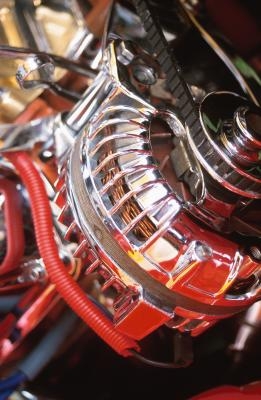
The alternator in your car charges your battery and powers your car's electrical system when the engine is running. There is no set or standard mileage at which an alternator should be replaced. Instead, alternators are typically replaced when they malfunction. Overheating can damage your alternator, as can voltage surges, but other electrical system problems can mimic the symptoms of a bad alternator. It is important to rule out other issues before replacing your alternator, otherwise you may go through the time and expense only to find your alternator wasn't the problem.
Many automobiles have a battery or alternator warning light on the dashboard. The light typically turns on when the ignition is turned and turns off once the engine is started. If there is a problem with your alternator or battery, the warning light will remain lit after the engine is started. Check your car's manual if you are unable to locate the warning light. If the light fails to turn on, the bulb may be burned out or broken.
Conducting a load test will indicate whether or not your alternator needs to be replaced. To conduct a load test, turn your car's headlights on. Note the level of brightness of the headlights. Start the car. If the level of brightness does not change, your alternator is likely fine. If the light from the headlights is dimmer once the car is started, then the headlights are using battery power and your alternator needs to be replaced. If the level of brightness increases, the alternator is producing a current, but it may not be enough to charge the battery normally.
You can test your charging system with a voltmeter. Purchase or borrow an automotive voltmeter to check the load across the battery terminals, following the manufacturer's instructions. Start with the ignition off. The voltmeter reading should be 12 volts. Turn the car on, but make sure all accessories, including the radio, are turned off. The voltmeter reading should be 14 to 14.5 volts. Turn all accessories on. The voltmeter should read 13 volts or higher. If any of the readings are lower than normal, your charging system needs to be checked and your alternator may need to be replaced.
If your alternator is malfunctioning, your engine may crank more slowly when you turn the ignition. Your interior lights may seem dim. The electrical system may start malfunctioning, causing power locks to activate for no apparent reason. If your recently replaced battery has died, your alternator may need to be replaced.